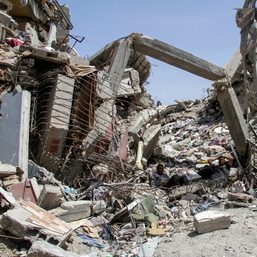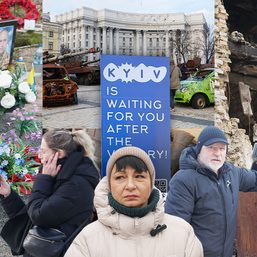SUMMARY
This is AI generated summarization, which may have errors. For context, always refer to the full article.
![[OPINION] Where are the war crimes trials? Lessons from Junaid Awal](https://www.rappler.com/tachyon/2023/10/ispeak-warcrime-trials.jpg)
The name Junaid Awal may not ring a bell for most people, but for international humanitarian law (IHL) experts, Awal is an important figure. He is the first and only Filipino to ever be convicted of violating Republic Act No. 9851 or the “Philippine Act on Crimes Against International Humanitarian Law, Genocide, and Other Crimes Against Humanity.”
Behind the name and the eventual prosecution lies a horrible story. Awal was indicted for holding a minor girl captive and, through threats and intimidation, he enslaved and raped her – acts committed while a violent armed conflict was happening in Marawi City.
As a native of Marawi City, it breaks my heart to read how the perpetrators ravished and shattered the city and the life of each Maranao. Every day when I drive to work, I see how my hometown has been shattered by the violence that engulfed it years ago. I cannot imagine how the minor-victim goes through her life.
Because his actions took place during the Marawi siege and were found to be part of a widespread or systematic attack directed against civilians, it is likely there are hundreds of other cases like this that never reached the courts.
Some do reach the courts but are not classified as war crimes; I see them daily. As an Assisting Judge in RTC Branch 19 in Isulan, Sultan Kudarat, I review cases of trafficked children, people trafficked as sex slaves to rebel groups, and willful killings of civilians caught in the crossfire during armed conflicts. They are a testament to the fact that our society continues to be affected by war.
Awal was found guilty of Section 6 of RA No. 9851, in the 2019 decision issued by the Regional Trial Court Branch 70 of Taguig City. His penalty? Reclusion perpetua (imprisonment for up to a maximum of 40 years) and a fine of P500,000. While the case is assumed to be on pending automatic appeal, you might be interested to know more about why Awal is said to have violated IHL.
International humanitarian law, also known as the law of armed conflict, is the set of rules that regulates the conduct of war. Cruel as it may seem, the international community has long recognized that war is unavoidable and the only thing to mitigate the effects of war is to “humanize” it. There are rules that must be observed when parties (state or non-state) enter into war and one of the requirements is to define and penalize acts that violate IHL.
RA No. 9851, fondly called by the legal community as the Philippine domestic humanitarian law, was already passed on December 11 2009, around 10 years before the Awal conviction. It defines and penalizes “war crimes” or “crimes against international humanitarian law” (Section 4), genocide (Section 5) and “other crimes against humanity” (Section 6). For example, a war crime may be committed by the willful killing of a wounded fighter, or torturing a civilian, or taking hostages. If one commits all acts, he commits three separate war crimes.
RA No. 9851 was a sleeping penal law from 2009 until 2017 when the Marawi siege broke world news. When Awal was captured, the Department of Justice (DOJ) had to grapple with RA No. 9851, and stakeholders realized they needed to take a closer look at the law. Focus group discussions and capacity-building sessions for prosecutors and law enforcement agents were held.
After the resolution of that case, I had the opportunity to assist the DOJ in conducting capacity-building activities for prosecutors nationwide in preparation for any future cases so that we would be more aware of IHL and the existence of RA 9851. The DOJ worked tirelessly to pool 10 prosecutors, including me, and train us in IHL. With the able technical assistance of the International Committee of the Red Cross (ICRC) and Jude Romano, a consultant who was a former international prosecutor in the Bosnian War Tribunal, the pool of trainers was able to draft and come up with the Prosecutors Specialization Course in International Humanitarian Law (PSCIHL). This specialized course was delivered to DOJ prosecutors nationwide in 2021 and is still being run.
The Supreme Court had been galvanized into action when the Marawi siege happened. On August 7, 2018, the Supreme Court adopted AM 18-07-25-SC, designating special courts to try, hear, and decide cases involving crimes punishable under RA No. 9851. The Supreme Court identified 11 Regional Trial Courts in the country (Taguig City, Laoag in Ilocos Norte, Angeles City in Pampanga, Lucena in Quezon Province, Legaspi City in Albay, Mandaue City in Cebu Province, Tacloban City in Leyte, Zamboanga City in Zamboanga del Sur, Cagayan de Oro City in Misamis Oriental, and Davao City in Davao del Sur) and trained their presiding judges in IHL. Mandated by RA No. 9851, special training is required because of the complexities in understanding when an armed conflict starts and stops to determine if a war crime was committed and apply the law.
However, what did we really learn from Awal? If you read the narration of established facts in the decision dated March 15, 2019, you will be disgusted by the gruesome, inhuman, and deplorable effects of war on its victims. But since 2019, Awal is still the only person to have been convicted of crimes under RA 9851. Where are the other cases? Where is real justice?
I challenge the community, law enforcement agents, prosecutors, and judges to proactively report, investigate, and prosecute violations of IHL. After all, it is the state’s responsibility to ensure such crimes do not go unpunished. We need to act if we want those inhuman acts to end. Because if we remain indifferent and inactive, George Santayana might be correct when he said: “Only the dead have seen the end of the war.” – Rappler.com
Judge Samina Macabando-Usman is the presiding judge of Regional Trial Court 8 in Marawi City.
Add a comment
How does this make you feel?




![[OPINION] Unjust wars and a just peace](https://www.rappler.com/tachyon/2024/03/tl-unjust-war-just-peace03262024.jpg?resize=257%2C257&crop_strategy=attention)
There are no comments yet. Add your comment to start the conversation.